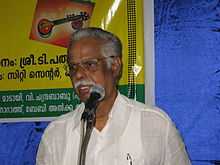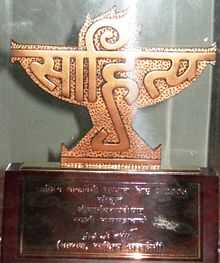T. Padmanabhan
| T. Padmanabhan | |
|---|---|
 | |
| Born |
1 January 1931 Kannur, Kerala State, India |
| Occupation | Short story writer |
| Notable works | Prakasam Parathunna Oru Penkutty, Gowri, Kadal, Thiranjedutha Kathakal |
| Notable awards |
Ezhuthachan Award Vallathol Award Vayalar Award Odakkuzhal Award Kendra Sahitya Akademi Award Kerala Sahitya Akademi Award |
| Years active | 1950–present |
Thinakkal Padmanabhan, popularly known as T. Padmanabhan, is an Indian short story writer. He is considered one of the greatest short fiction writers in Malayalam language and is credited with bringing modern Malayalam literature nearer to the subjective intensity of the lyric.[1]
Life
T. Padmanabhan was born 1931 in Kannur, Kerala in a poor family as the youngest of the four children. His father died when he was still a baby and it was his mother and the eldest brother who looked after him during his childhood.[2]
During his early schooling in Kannur, Padmanabhan was active in student politics, participating in the Independence struggle. Subsequently, he graduated in Law and started his practice in Thalassery and Kannur courts. By this time, he had already established himself as a budding writer and M. K. K. Nair,[3] a known arts enthusiast and then chairman and managing director of F A C T, invited him to join the company. Padmanabhan joined F.A.C.T. and slowly rose to be the head of Materials Division and retired in 1989 as its Deputy general manager. In between, he had a string of legal tussles with the company after M. K. K. Nair left F A C T ((Reminiscences on Television).[4]
Padmanabhan is married and the couple has no children. He now lives a retired life in Kannur.
Literary career
He started writing at the age of 19[5] and has written more than 170 stories. Prakasam Parathunna Oru Penkutty (The Girl Who Spreads Radiance, 1955), Oru Kathakrithu Kurishil (A Story Writer being Crucified, 1956), Makhan Singhinte Maranam (The Death of Makhan Singh, 1958), Kala Bhairavan and Gouri (1993) are some of his major works. His stories have been translated in almost every Indian languages and foreign languages such as Russian, French and English. He received the Vayalar Award in 2001 for his story Puzha Kadannu Marangalude Edayileku. He has also received Kendra Sahitya Akademi Award, Kerala Sahitya Akademi Award, Vallathol Award and Lalithambika Andharjanam Award.
T. Padmanabhan has been credited with bringing the modern Malayalam short story nearer to the subjective intensity of the lyric. It is said that when the short story reached a saturation point as a result of the repeated depiction of romantic idealism and social commitment that T. Padmanabhan emerged on the scene with arguably a unique and highly individualistic idiom.[6]
In his book A Short History of Malayalam Literature, K. Ayyappa Panicker notes,
What appeals most to his readers in all his early and recent stories is the lyrical quality of the language and the aesthetics of his perceptions, especially in the portrayal of loneliness and helplessness.[1]
Major literary awards
T. Padmanabhan has a habit of declining awards. Nevertheless he has won a great number of awards including the prestigious Kendra Sahitya Akademi and Kerala Sahitya Akademi awards for his works.
- 2014: Bharatiya Bhasha Parishad Award[7]
- 2014: C. V. Kunhuraman Literary Prize[8]
- 2012: Kerala Sahitya Akademi Fellowship[9]
- 2007: Muttathu Varkey Award[10]
- 2003: Ezhuthachan Award[11]
- 2001: Vallathol Award
- 2000: Vayalar Award
- 1995: Odakkuzhal Award for Kadal (Refused)
- 1998: Lalithambika Andharjanam Award[12]
- 1996: Kendra Sahitya Akademi Award for Gowry (Refused)
- 1973: Kerala Sahitya Akademi Award for Saakshi (Refused)
Major works
- Prakasam Parathunna Oru Penkutty (The Girl Who Spreads Light) (1955)
- Oru Kathakrithu Kurishil (A Story Writer on the Crucifix) (1956)
- Makhan Singhinte Maranam (The Death of Makhan Singh) (1958)
- T. Padmanabhante Thiranjedutha Kathakal (Selected Stories of T. Padmanabhan) (1971)
- Saakshi (The Witness) (1973)
- Harison Sayvinte Naaya (Mr. Harison's Dog) (1979)
- Veedu Nashtappetta Kutty (The Child Who Lost His Home) (1983)
- Kalabhairavan (Lord Siva) (1986)
- Nalinakanthi (The Beauty of the lotus) (1988)
- Gowry (1991)
- Kadal (The Sea) (1994)
- Padmanabhante Kathakal (Stories of Padmanabhan) (1995)
References
- ↑ 1.0 1.1 K. Ayyappa Panicker (November 1977). A Short History of Malayalam Literature. Information & Public Relations Department, Kerala State. pp. 114–115.
- ↑ Video on YouTube
- ↑ http://www.nairs.in/bio_n.htm
- ↑ Video on YouTube
- ↑ 60years of writing on YouTube
- ↑ http://www.seasonsindia.com/art_culture/lit_malayalam_sea.htm#padmanabhan
- ↑ "ഭാരതീയ സാഹിത്യ പരിഷത്തിന്റെ പുരസ്കാരം ടി.പത്മനാഭന്". DC Books. Retrieved 2 January 2015.
- ↑ http://www.newindianexpress.com/cities/thiruvananthapuram/Literary-Award-for-T-Padmanabhan/2014/04/02/article2144845.ece
- ↑ http://www.kaumudi.com/innerpage1.php?newsid=22611
- ↑ http://www.thehindu.com/todays-paper/tp-national/tp-kerala/muttathu-varkey-award-presented-to-padmanabhan/article1848804.ece
- ↑ The Hindu : Ezhuthachan award for T. Padmanabhan
- ↑ official website of INFORMATION AND PUBLIC RELATION DEPARTMENT
External links
| Wikimedia Commons has media related to T. Padmanabhan. |
- The Hindu article
- T. Padmanabhan at Malayalamresourcecentre.org
- Interview on Indiavision on YouTube
- Profile on Good Reads
- Interview on MediaOne Part 1 on YouTube
- Interview on MediaOne Part 2 on YouTube
- Reminiscences on YouTube
- Speech on YouTube
- Works by or about T. Padmanabhan in libraries (WorldCat catalog)
| ||||||
|
